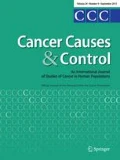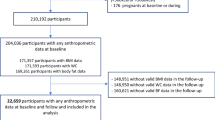Abstract
Background
Dietary carbohydrate, glycemic index, and glycemic load are thought to influence colorectal cancer risk through hyperinsulinemia. We review and quantitatively summarize in a meta-analysis the evidence from prospective cohort studies.
Methods
We searched the PubMed database for prospective studies of carbohydrate, glycemic index, and glycemic load and colorectal cancer risk, up to October 2011. Summary relative risks were estimated by the use of a random effects model.
Results
We identified 14 cohort studies that could be included in the meta-analysis of carbohydrate, glycemic index, and glycemic load and colorectal cancer risk. The summary RR for high versus low intake was 1.00 (95% CI: 0.87–1.14, I 2 = 31%) for carbohydrate, 1.07 (95% CI: 0.99–1.16, I 2 = 28%) for glycemic index, and 1.00 (95% CI: 0.91–1.10, I 2 = 39%) for glycemic load. In the dose–response analysis, the summary RR was 0.95 (95% CI: 0.84–1.07, I 2 = 58%) per 100 grams of carbohydrate per day, 1.07 (95% CI: 0.99–1.15, I 2 = 39%) per 10 glycemic index units, and 1.01 (95% CI: 0.95–1.08, I 2 = 47%) per 50 glycemic load units. Exclusion of one or two outlying studies reduced the heterogeneity, but the results were similar.
Conclusion
This meta-analysis of cohort studies does not support an independent association between diets high in carbohydrate, glycemic index, or glycemic load and colorectal cancer risk.





Similar content being viewed by others
References
Ferlay J, Shin HR, Bray F, Forman D, Mathers C, Parkin DM (2010) Estimates of worldwide burden of cancer in 2008: GLOBOCAN 2008. Int J Cancer 127:2893–2917
Armstrong B, Doll R (1975) Environmental factors and cancer incidence and mortality in different countries, with special reference to dietary practices. Int J Cancer 15:617–631
Kolonel LN (1980) Cancer patterns of four ethnic groups in Hawaii. J Natl Cancer Inst 65:1127–1139
Kono S (2004) Secular trend of colon cancer incidence and mortality in relation to fat and meat intake in Japan. Eur J Cancer Prev 13:127–132
World Cancer Research Fund/American Institute for Cancer Research Food, Nutrition, Physical Activity and the Prevention of Cancer: a Global Perspective. AICR, Washington DC, 2007
Larsson SC, Orsini N, Wolk A (2005) Diabetes mellitus and risk of colorectal cancer: a meta-analysis. J Natl Cancer Inst 97:1679–1687
Giovannucci E (2001) Insulin, insulin-like growth factors and colon cancer: a review of the evidence. J Nutr 131:3109S–3120S
Pisani P (2008) Hyper-insulinaemia and cancer, meta-analyses of epidemiological studies. Arch Physiol Biochem 114:63–70
Ma J, Giovannucci E, Pollak M et al (2004) A prospective study of plasma C-peptide and colorectal cancer risk in men. J Natl Cancer Inst 96:546–553
Kaaks R, Toniolo P, Akhmedkhanov A et al (2000) Serum C-peptide, insulin-like growth factor (IGF)-I, IGF-binding proteins, and colorectal cancer risk in women. J Natl Cancer Inst 92:1592–1600
Wei EK, Ma J, Pollak MN et al (2005) A prospective study of C-peptide, insulin-like growth factor-I, insulin-like growth factor binding protein-1, and the risk of colorectal cancer in women. Cancer Epidemiol Biomarkers Prev 14:850–855
Otani T, Iwasaki M, Sasazuki S, Inoue M, Tsugane S (2007) Plasma C-peptide, insulin-like growth factor-I, insulin-like growth factor binding proteins and risk of colorectal cancer in a nested case–control study: the Japan public health center-based prospective study. Int J Cancer 120:2007–2012
Jenab M, Riboli E, Cleveland RJ et al (2007) Serum C-peptide, IGFBP-1 and IGFBP-2 and risk of colon and rectal cancers in the European Prospective Investigation into Cancer and Nutrition. Int J Cancer 121:368–376
Jee SH, Ohrr H, Sull JW, Yun JE, Ji M, Samet JM (2005) Fasting serum glucose level and cancer risk in Korean men and women. JAMA 293:194–202
Brand-Miller JC (2004) Postprandial glycemia, glycemic index, and the prevention of type 2 diabetes. Am J Clin Nutr 80:243–244
Jenkins DJ, Wolever TM, Taylor RH et al (1981) Glycemic index of foods: a physiological basis for carbohydrate exchange. Am J Clin Nutr 34:362–366
Atkinson FS, Foster-Powell K, Brand-Miller JC (2008) International tables of glycemic index and glycemic load values: 2008. Diabetes Care 31:2281–2283
Bostick RM, Potter JD, Kushi LH et al (1994) Sugar, meat, and fat intake, and non-dietary risk factors for colon cancer incidence in Iowa women (United States). Cancer Causes Control 5:38–52
Chyou PH, Nomura AM, Stemmermann GN (1996) A prospective study of colon and rectal cancer among Hawaii Japanese men. Ann Epidemiol 6:276–282
Kato I, Akhmedkhanov A, Koenig K, Toniolo PG, Shore RE, Riboli E (1997) Prospective study of diet and female colorectal cancer: the New York University Women’s Health Study. Nutr Cancer 28:276–281
Terry PD, Jain M, Miller AB, Howe GR, Rohan TE (2003) Glycemic load, carbohydrate intake, and risk of colorectal cancer in women: a prospective cohort study. J Natl Cancer Inst 95:914–916
Higginbotham S, Zhang ZF, Lee IM et al (2004) Dietary glycemic load and risk of colorectal cancer in the Women’s Health Study. J Natl Cancer Inst 96:229–233
Michaud DS, Fuchs CS, Liu S, Willett WC, Colditz GA, Giovannucci E (2005) Dietary glycemic load, carbohydrate, sugar, and colorectal cancer risk in men and women. Cancer Epidemiol Biomarkers Prev 14:138–147
McCarl M, Harnack L, Limburg PJ, Anderson KE, Folsom AR (2006) Incidence of colorectal cancer in relation to glycemic index and load in a cohort of women. Cancer Epidemiol Biomarkers Prev 15:892–896
Larsson SC, Giovannucci E, Wolk A (2007) Dietary carbohydrate, glycemic index, and glycemic load in relation to risk of colorectal cancer in women. Am J Epidemiol 165:256–261
Strayer L, Jacobs DR Jr, Schairer C, Schatzkin A, Flood A (2007) Dietary carbohydrate, glycemic index, and glycemic load and the risk of colorectal cancer in the BCDDP cohort. Cancer Causes Control 18:853–863
Weijenberg MP, Mullie PF, Brants HA, Heinen MM, Goldbohm RA, van den Brandt PA (2008) Dietary glycemic load, glycemic index and colorectal cancer risk: results from the Netherlands Cohort Study. Int J Cancer 122:620–629
Kabat GC, Shikany JM, Beresford SA et al (2008) Dietary carbohydrate, glycemic index, and glycemic load in relation to colorectal cancer risk in the Women’s Health Initiative. Cancer Causes Control 19:1291–1298
Howarth NC, Murphy SP, Wilkens LR, Henderson BE, Kolonel LN (2008) The association of glycemic load and carbohydrate intake with colorectal cancer risk in the Multiethnic Cohort Study. Am J Clin Nutr 88:1074–1082
George SM, Mayne ST, Leitzmann MF et al (2009) Dietary glycemic index, glycemic load, and risk of cancer: a prospective cohort study. Am J Epidemiol 169:462–472
Li HL, Yang G, Shu XO et al. (2011) Dietary glycemic load and risk of colorectal cancer in Chinese women. Am J Clin Nutr 93:101-107
Gnagnarella P, Gandini S, La Vecchia C, Maisonneuve P (2008) Glycemic index, glycemic load, and cancer risk: a meta-analysis. Am J Clin Nutr 87:1793–1801
Stroup DF, Berlin JA, Morton SC et al (2000) Meta-analysis of observational studies in epidemiology: a proposal for reporting. Meta-analysis Of Observational Studies in Epidemiology (MOOSE) group. JAMA 283:2008–2012
Mulholland HG, Murray LJ, Cardwell CR, Cantwell MM (2009) Glycemic index, glycemic load, and risk of digestive tract neoplasms: a systematic review and meta-analysis. Am J Clin Nutr 89:568–576
Tasevska N, Jiao L, Cross AJ et al (2012) Sugars in diet and risk of cancer in the NIH-AARP Diet and Health Study. Int J Cancer 130:159–169
Stemmermann GN, Nomura AM, Heilbrun LK (1984) Dietary fat and the risk of colorectal cancer. Cancer Res 44:4633–4637
Garland C, Shekelle RB, Barrett-Connor E, Criqui MH, Rossof AH, Paul O (1985) Dietary vitamin D and calcium and risk of colorectal cancer: a 19-year prospective study in men. Lancet 1:307–309
Heilbrun LK, Nomura A, Hankin JH, Stemmermann GN (1989) Diet and colorectal cancer with special reference to fiber intake. Int J Cancer 44:1–6
Stemmermann GN, Nomura AM, Chyou PH, Yoshizawa C (1990) Prospective study of alcohol intake and large bowel cancer. Dig Dis Sci 35:1414–1420
DerSimonian R, Laird N (1986) Meta-analysis in clinical trials. Control Clin Trials 7:177–188
Greenland S, Longnecker MP (1992) Methods for trend estimation from summarized dose-response data, with applications to meta-analysis. Am J Epidemiol 135:1301–1309
Higgins JP, Thompson SG (2002) Quantifying heterogeneity in a meta-analysis. Stat Med 21:1539–1558
Egger M, Davey SG, Schneider M, Minder C (1997) Bias in meta-analysis detected by a simple, graphical test. BMJ 315:629–634
Begg CB, Mazumdar M (1994) Operating characteristics of a rank correlation test for publication bias. Biometrics 50:1088–1101
Flood A, Peters U, Jenkins DJ et al (2006) Carbohydrate, glycemic index, and glycemic load and colorectal adenomas in the Prostate, Lung, Colorectal, and Ovarian Screening Study. Am J Clin Nutr 84:1184–1192
Oh K, Willett WC, Fuchs CS, Giovannucci EL (2004) Glycemic index, glycemic load, and carbohydrate intake in relation to risk of distal colorectal adenoma in women. Cancer Epidemiol Biomarkers Prev 13:1192–1198
Stemmermann GN, Heilbrun LK, Nomura AM (1988) Association of diet and other factors with adenomatous polyps of the large bowel: a prospective autopsy study. Am J Clin Nutr 47:312–317
Macquart-Moulin G, Riboli E, Cornee J, Kaaks R, Berthezene P (1987) Colorectal polyps and diet: a case–control study in Marseilles. Int J Cancer 40:179–188
Neugut AI, Garbowski GC, Lee WC et al (1993) Dietary risk factors for the incidence and recurrence of colorectal adenomatous polyps. A case–control study. Ann Intern Med 118:91–95
Lubin F, Rozen P, Arieli B et al (1997) Nutritional and lifestyle habits and water-fiber interaction in colorectal adenoma etiology. Cancer Epidemiol Biomarkers Prev 6:79–85
Diergaarde B, Tiemersma EW, Braam H et al (2005) Dietary factors and truncating APC mutations in sporadic colorectal adenomas. Int J Cancer 113:126–132
Almendingen K, Hofstad B, Vatn MH (2004) Dietary habits and growth and recurrence of colorectal adenomas: results from a three-year endoscopic follow-up study. Nutr Cancer 49:131–138
Barclay AW, Petocz P, Millan-Price J et al (2008) Glycemic index, glycemic load, and chronic disease risk—a meta-analysis of observational studies. Am J Clin Nutr 87:627–637
Mente A, de Koning L, Shannon HS, Anand SS (2009) A systematic review of the evidence supporting a causal link between dietary factors and coronary heart disease. Arch Intern Med 169:659–669
Biddinger SB, Ludwig DS (2005) The insulin-like growth factor axis: a potential link between glycemic index and cancer. Am J Clin Nutr 82:277–278
Kaaks R, Lukanova A (2001) Energy balance and cancer: the role of insulin and insulin-like growth factor-I. Proc Nutr Soc 60:91–106
Pi-Sunyer FX (2002) Glycemic index and disease. Am J Clin Nutr 76:290S–298S
Holt SH, Miller JC, Petocz P (1997) An insulin index of foods: the insulin demand generated by 1000-kJ portions of common foods. Am J Clin Nutr 66:1264–1276
Bao Y, Nimptsch K, Meyerhardt JA et al (2010) Dietary insulin load, dietary insulin index, and colorectal cancer. Cancer Epidemiol Biomarkers Prev 19:3020–3026
Aune D, Lau R, Chan DS et al (2011) Nonlinear reduction in risk for colorectal cancer by fruit and vegetable intake based on meta-analysis of prospective studies. Gastroenterology 141:106–118
Aune D, Chan DS, Lau R et al (2011) Dietary fibre, whole grains, and risk of colorectal cancer: systematic review and dose-response meta-analysis of prospective studies. BMJ 343:d6617
Acknowledgement
We thank the systematic literature review team at the Wageningen University for their contributions to the colorectal cancer database. This work was funded by the World Cancer Research Fund (grant number 2007/SP01) as part of the Continuous Update Project. The views expressed in this review are the opinions of the authors. They may not represent the views of WCRF International/AICR and may differ from those in future updates of the evidence related to food, nutrition, physical activity, and cancer risk. All authors had full access to all of the data in the study. D. Aune takes responsibility for the integrity of the data and the accuracy of the data analysis. The authors declare that there are no conflicts of interest.
Conflict of interest
None declared.
Author information
Authors and Affiliations
Corresponding author
Rights and permissions
About this article
Cite this article
Aune, D., Chan, D.S.M., Lau, R. et al. Carbohydrates, glycemic index, glycemic load, and colorectal cancer risk: a systematic review and meta-analysis of cohort studies. Cancer Causes Control 23, 521–535 (2012). https://doi.org/10.1007/s10552-012-9918-9
Received:
Accepted:
Published:
Issue Date:
DOI: https://doi.org/10.1007/s10552-012-9918-9




